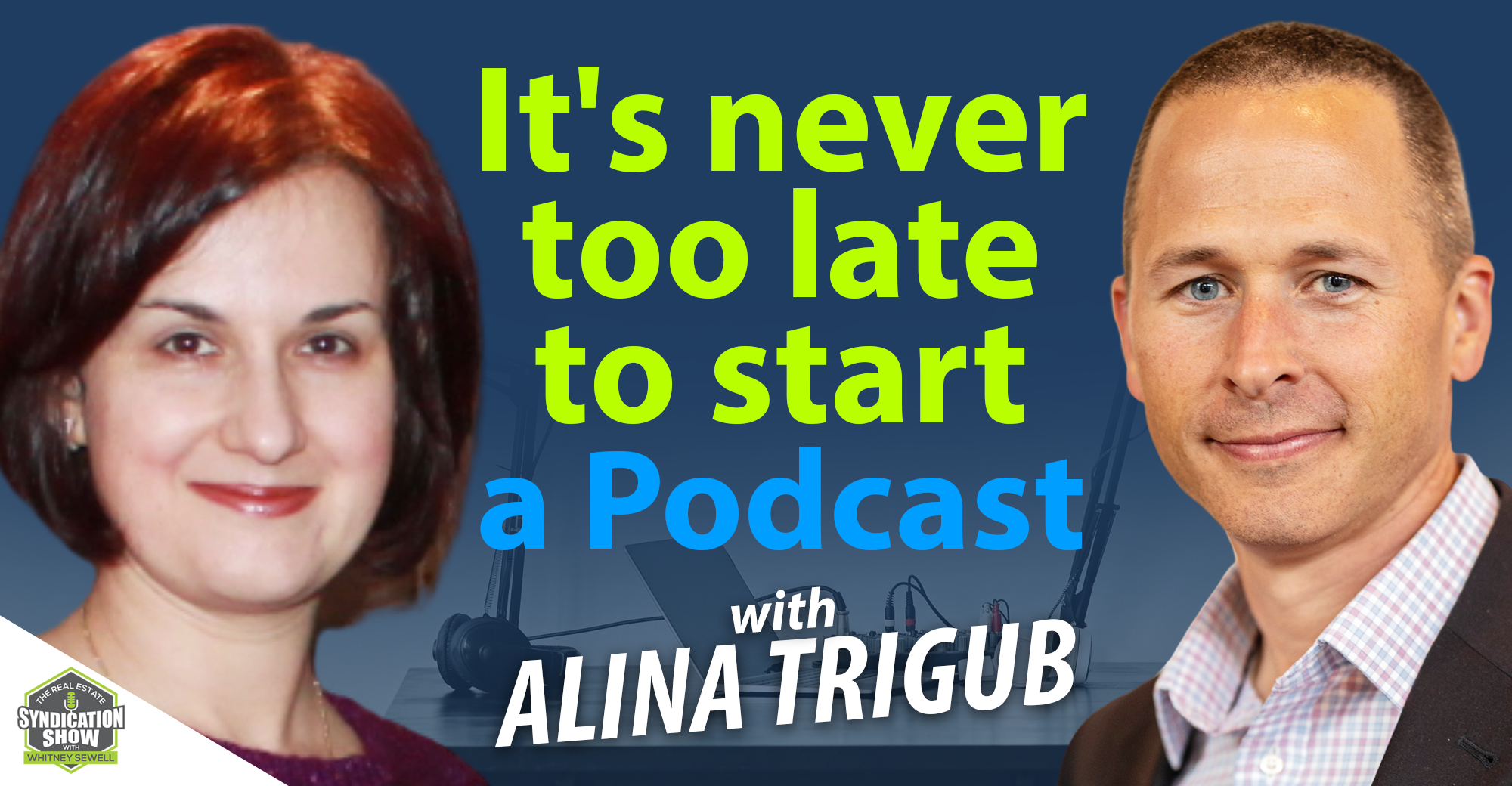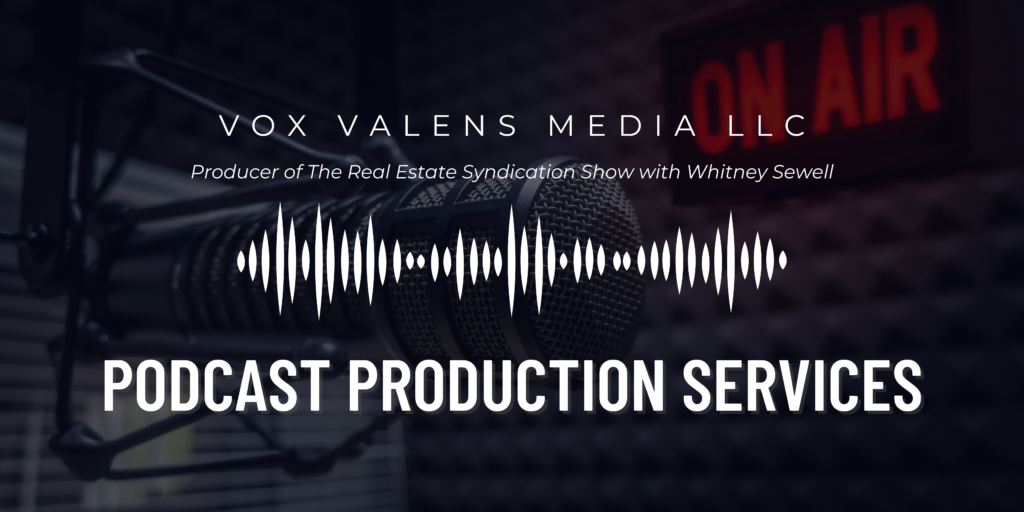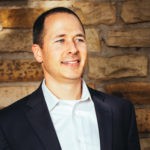
Are you thinking about starting your own podcast? In this episode, we feature the conversation between Whitney Sewell and SAMO Financial managing partner Alina Trigub. Alina has questions about starting a podcast, how often it should be, hiring a team or doing it yourself, and how to choose a topic.
Our Gracious Sponsor
Vox Valens Media

The team that produces The Real Estate Syndication Show is now available to produce podcasts for you! View our list of services and rates here or book a call to know more!
📱https://calendly.com/voxvalensmedia/podcastproduction
Watch the episode here:
Listen to the podcast here:
Whitney shares valuable tips on starting a podcast. He shares that it does not have to be a daily show and that you need to check your commitment level to figure out how often you should air your podcast. He also highlights the byproducts of having a podcast and how it can help you grow your network and at the same time add value to other people. He encourages podcasters to produce shows that are educational, entertaining, and have high-quality guests. Tune in now and find out if podcasting is for you!
Key Points From This Episode:
- It’s a myth that it’s too late to start a podcast.
- A podcast does not have to be daily.
- When deciding on how often you should air your podcast, you have to consider your commitment level to it.
- Is doing a weekly show worth it?
- The byproducts of having a podcast are so valuable.
- Why interviews are a very important component of a podcast?
- Produce shows that are educational, entertaining, and with high-quality guests.
- Should you hire a team or do it yourself to produce a podcast?
Tweet This!
“It’s a myth that it’s too late to start a podcast.” [0:00:30]
“I would say that the more interview you do, the more connections you make. It’s simple math. Right? The more interviews you do, the more content you produce, the more people you get in front of, then the more networking you’re able to do. So it works faster.” [0:01:30]
“There are so many byproducts of having a podcast that you can’t even put a value on. You cannot put a value on it. All the connections that I’ve made with the podcast, even the thing that I would add to people that were on the show. All those connections are so valuable.” [0:02:20]
Links Mentioned in Today’s Episode:
The Life Bridge Capital website
WS63: How to Mitigate Risk by Diversifying into Real Estate Syndication with Alina Trigub
WS153: How to Vet a Deal Sponsor, Real Estate Market and Offering with Alina Trigub
WS203: Treat Your Investor Like Mom with Alina Trigub
WS841: The Importance Of Building Long-lasting Relationships From The Beginning with Alina Trigub
About Whitney Sewell

Founder of Life Bridge Capital LLC, Whitney began his real estate investing career in 2009. Whitney’s passion is working with investors, helping them secure financial security via the exceptional opportunities that multifamily syndication offers. Whitney hosts The Real Estate Syndication Show, a daily podcast where he has now interviewed over 1300 experts providing cutting-edge tools and strategies for the syndication business.
Whitney and his wife Chelsea are on a mission to help other families through the process of adoption. They have personally endured the financial burdens that the process puts on families and have committed 50% of their profits to this goal, through The Life Bridge Foundation. Whitney and Chelsea have three children by adoption.
Full Transcript
EPISODE 1328
Whitney Sewell (WS): There are so many by-products of having a podcast that you can’t even put a value on. You cannot put a value on it. All the connections that I’ve made through the podcast, even being able to add value to other people that are on the show, all of those connections are so valuable.
[INTERVIEW]
Alina Trigub (AT): Thinking of me starting a podcast, I don’t know, I never wanted one. But the word on the street, it hasn’t died down yet so I wanted to hear an expert opinion, someone who works hard to know what it takes to do it.
WS: You probably know most of the questions I would ask you. What’s your goal in doing it? What are you trying to accomplish? And I would think I probably know most of that. But still, you would need to think pretty hard about that. What are you trying to accomplish? It is a myth that it is too late to start a podcast and all that. Because you’re collecting your own following, it’s irrelevant that all these other podcasts were started or other people have followings like you. You have your own people, your own following. Your own people that are gonna connect with you that don’t connect with me, or Joe or Dan or all of these people that you and I could both name off. There’s gonna be people that you connect with, that love you and the things you do or stand for, and how you interview, or what you talk about, or that’s important to you. So, it’s just ultimately, if you want to get to it, commit to it and make it happen. Obviously, it’s not cheap either, but I’m a testament to it being worthwhile. So, yeah. What questions do you have specifically or how could I help you?
AT: Does it have to be daily?
WS: No, it does not have to be daily. I don’t even know that I would suggest it. A lot of people ask me all the time, should I do it daily? And I say, well, are you married? Do you have kids? Probably not then. Obviously, the more interviews you do, the more connections you make. It’s just simple math. The more interviews you do, the more content you produce, the more people you get in front of, the more networking you’re able to do. So, it just works faster. The more you can do. It’s just that simple. However, you have to consider the commitment level, and not just for you, but for your team or the commitment of the financial component of it and your family and the time it’s gonna take. Is it worth doing it weekly? Of course, no doubt about it. There’s so many – and I just hear this all the time – well, my downloads aren’t growing. I don’t have the following, and it’s just not as beneficial as I expected, and all these metrics which are so important. But there are so many by-products of having a podcast that you can’t even put a value on. You cannot put a value on it. All the connections that I’ve made through the podcast, even being able to add value to other people that are on the show, all of those connections are so valuable.
WS: Even to the point, like the first year of the podcast, nobody had a clue who I was. Well, a year later, most people knew who I was when I go to an event. Well, the next year, I’m speaking at the event. So, I can’t put a measurement on that, to the podcast. But that’s where all that came from or started. So, that will happen, but you just have to know it’s commitment. And I think you could easily do a weekly podcast, or maybe you do a weekly interview and a weekly solo show. There are so many ways to think through that where you can have two shows a week. You could do an interview and you could do even a 10- minute solo show a week. To make it so it’s not so burdensome but you’re still getting a couple of shows a week and they’re hearing you more often. If I hadn’t been doing a daily show, I would have tried to have done as many solo shows as I could. But doing a daily show, I just didn’t have the capacity to add because the time it takes for me to prep the content and things like that for myself to do a good quality solo show.
WS: But I think interviews are so important, the credibility by association and the connection, the networking that you get through that. The 10 minutes or 15 minutes that you’re not recording after the show is a most important time. That’s the most important time for you to connect to that person. But the solo shows allow you to be in the spotlight more as well with your following. But also, there’re so many by-products of that. Because as you develop, let’s say, this investor relations team or people or whatever, your investors have a question, they can just go find this podcast, like Alina did. Better to send to that investor. Listen to this 10-minute episode that I did about this topic. And then it’s still you being that expert. You gaining the credibility and all those things from your investor base. So, over time, I think solo shows are valuable but interviews are probably just as valuable. I just like doing a daily show, then I have the bandwidth to also do just to the planning involved to do a quality, that many quality solo shows anyway.
AT: Yeah, that was great. And you partially answered this question, but, what would you do differently if you were to start today?
WS: Yeah. If I had to do it again, personally, I believe that I would have done longer shows.
AT: You serious? With the attention some people have?
WS: I would have done longer shows. I’ll answer your question but then I’m gonna follow up with how we’re fixing the change in the show as well. Okay. So, if I had to start over again, I would have done longer shows except they would have been much more focused and segmented. And so, I could have still done daily content but they would have been much more focused. They would have been much deeper conversations. We would have been better prepared. And even more importantly, we could have had better guests. Consistently, we could have been more selective. So, when I’m interviewing 30 people a month, I can only be so selective about who my guests are, right? And listeners, while they still listen, you can only have so many guests that are sub-par before it’s like, eh, I’m gonna go listen to somebody else. But doing a daily show, you almost have, you have to air it almost. I mean, I’ve had a number of shows, a few, not many though, that we haven’t aired. But if I had been doing less shows, there are many shows I would not have aired. I would have had deeper conversations. I would have segmented those conversations. So, it’s like when you and I get on together to have an interview, you already know, hey, we’re gonna talk about these three topics that I know you’re an expert in. And we’re gonna spend this 10 or 15 minutes just talking about that.
WS: And we’re gonna go in deeper about that thing. Then that’s gonna turn into a show. And then we’re gonna have another segment that’s about this other topic, and we’re gonna go deeper on that topic as well. And that’s gonna be another show. So, then I may even have another day that’s like the whole show together. So, I can still do daily content but I can have more rich conversations, deeper conversations. And have to have fewer guests so I can have higher quality guests. It’s less problem now for us to find guests. Obviously, a lot of people wanna be on the show now. But that took a long time for that. We were sending 300 emails to get 30 people on in the beginning. And now it’s very different; people are coming to us now. But that doesn’t mean they’re all qualified to be on the show either. So, I’m transitioning now to almost what I just told you because my time is more valuable now as well. I can’t spend so much time doing interviews and I’m gonna have other people on the team that are doing some of these interviews as well. But still I wanna produce a better show it. I want it to be better content. I wanted it to be more educational, more in-depth conversations, but with higher quality guests as well. And so, looking back, knowing what I know now, if I hadn’t been married or had to have kids, I’ll just say, hey, I’m gonna do two of that. Really, I’m gonna figure out how to do two of that. But, I know now, if I had tried that, there’s no way I could have kept up.
WS: I could not. Even me only doing interviews. There’s no way I could have kept up with that while still working full-time and trying to do deals and all the mess, you know that, the story. But if I was doing it full-time and I wasn’t married or kids, yeah, I’d figure out how to do that. Because you could do, let’s say you did two long interviews on Monday, two long interviews on Tuesday, and then the rest of the week you were preparing for your next Monday and Tuesday. Let’s say you spend another half a day preparing for the next Monday and Tuesday interviews. We still got half a week to do other stuff. And you can still make plenty of segments out of those four long interviews for like two days, two shows a day. Understand, there’re ways do that and be very creative. But if I did have kids and wife, I would go back to the longer, I say even 45 minutes to an hour segment. But it’ll be broken up in, let’s say, 10 to 15-minute increments where we spend just a few minutes about your background, those things, but not focusing so much on like, tell me your back story. Tell me how you got into real estate. I’m gonna share with listeners why you’re qualified to be on. You’re gonna share a little bit but we’re not gonna spend half the interview talking about your path to real estate. So, we’re gonna spend a few minutes on that, then it’s gonna be like, okay, you’re an expert in this, I wanna know how you do this, and we’re gonna dive in on that thing.
AT: Whitney, I hear where you’re coming from. You wanna spend more time on a specific topic of expertise of your entry, by the same token, what I found is that many people connect better when they can relate. I’m a former teacher, I became a syndicator. Oh, here’s a teacher, I am a professor in college. I can do it too. So, you can’t really skip that. You still need that segment of the bio. But maybe not spread out more than, I don’t know, 3 to 5 minutes.
WS: Yeah, I agree completely. They do need to connect with that guest for sure. And I think that’s wise.
AT: And again, if you were to do it, would you do it like DIY or would you hire a team out? And when I say DIY, I mean, build your own team like you did and like you’re offering services now. Or would you just have someone who is in that field, this XYZ podcasting offering their service, should I hire them?
WS: If I was doing a weekly show, I’d probably find somebody myself that knows how to do it all. I would not do it myself. That’s just not the best and highest use of your time. You might hire a virtual assistant that could do most of the podcast for notes.
AT: That’s what I mean. Build a VA team yourself or outsourcing it to someone who already does it cookie-cutter, which is expensive.
WS: So, I would price both. Because there are definitely pros and cons to both. With somebody that’s in-house, like if you hire somebody personally, like you don’t use a production company, you’re gonna be able to make changes faster. Just like property management, almost. It’s the same thing. You’re gonna be able to make changes faster. When you’re the manager, you can make changes faster. You can put things in motion faster. You can try different things and see how they like…you can do those things and mess around a little bit. Maybe it takes your person 30 more minutes, okay, you’re paying them how much an hour. Like, you’re making that decision really quickly as opposed to going through a production company that’s gonna be more cookie cutter. We’re gonna try to make, our team’s gonna try to do the show exactly how you want. You wanna make changes, they’re gonna try to do it. But it’s still gonna happen faster if you’re talking directly to that individual that’s doing all your production, someone who’s working for you. But that’s potentially gonna be more expensive. I don’t know. I think you’re gonna benefit either way by having a podcast. Whether you go either of those routes, as long as you are not editing audio and video yourself.
AT: I have no interest in doing that. Okay, now this is helpful. Thank you so much.
[END OF INTERVIEW]
[OUTRO]
WS: Thank you for being a loyal listener of the Real Estate Syndication Show. Please subscribe and like the show, share it with your friends so we can help them as well. Don’t forget, go to the LifeBridgeCapital.com where you can sign up and start investing in real estate today. Have a blessed day.
[END]
Love the show? Subscribe, rate, review, and share!
Join the Real Estate Syndication Show Community:




